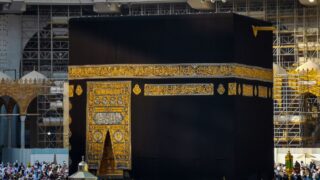Eid Al-Adha is one of the great days in Islam. It is a day of celebration for Muslims all over the world. Allah has bestowed upon us two festive days in the year, which we celebrate with joy, meals, and sharing the happiness with the underprivileged. Those days areE id Al-Fitr and Eid Al-Adha. Hence, Muslims are not allowed to fast on both days. We celebrate Eid Al-Fitr upon the completion of Ramadan, a whole month of fasting. We then celebrate `Eid Al-Adha for having successfully performed the great journey of Hajj, followed by sacrifice (udhiyah).
Today, we see people racing and rushing to be successful in all their endeavors, be it in their career, business, social life, or others. These are their personal wishes and desires. While in pursuit of such desires, let us not forget the very purpose of our creation, that is, to be true servants of Allah: [I have not created the jinn and mankind except to worship Me] (Adh-Dhariyat 51:56).
For us to be His true servants, we certainly need to prove our commitment, through our sacrifices and efforts that reflect our true obedience to Allah. All acts of worship contain this very message. Through these acts of worship we will be able to train ourselves to give our full commitment to Allah the Almighty, Lord of the Worlds. One of the acts of worship that is considered to be a huge sacrifice and jihad, or great struggle, is Hajj.
The Hajj rituals performed by Muslims annually have a lot of significance and are full of lessons. Hajj teaches us the importance of sacrifice, which qualifies us to get the great blessings and rewards from Allah. It is not easy to get Allah’s pleasure and forgiveness. To get them, we need to sacrifice, and we also need a high level of commitment. The reward for an accepted Hajj or Hajj mabrur is forgiveness for all sins, a state which the Prophet (peace and blessings be upon him) likened to that of a newborn baby, pure and clean. To get such rewards, we need to put forward our sacrifices; we need patience and a high level of commitment. Such rewards are invaluable; they cannot be bought with money or wealth.
There will definitely be trials and tribulations while performing Hajj. Hence, to be duly rewarded, one must have patience and strong determination while performing the rituals. We see millions of devotees gathering in one big place, donning the same clothing, regardless of their social status, rich and poor, and coming from different races and backgrounds. Undoubtedly, under such conditions, there will be profound trials and challenges. Those who can overcome these challenges develop within themselves a strong spirit of sacrifice, a spirit that will shape their personalities and bring goodness to all those around them.
What are the values of sacrifice that we can learn from Hajj? Before we answer this question, let us reflect on the story of Prophet Ibrahim and how he was willing to sacrifice his child Isma`il (peace and blessings be upon them):
[Then when (the son) reached (the age of) (serious) work with him, he said: “O my son; I see in vision that I offer thee in sacrifice. Now say what is thy view.” (The son) said: “O my father; do as thou art commanded; thou will find me, if Allah so wills, one of the steadfast.” So when they had both submitted their wills (to Allah), and he flung him down upon his face (for sacrifice), We called out to him, “O Ibrahim; thou hast already fulfilled the vision; thus indeed do We reward those who do right.] (As-Saffat 37:102-106)
That was the huge sacrifice of both Prophet Ibrahim and his son Ismail. Prophet Ibrahim was ready to sacrifice his own beloved son, just for Allah the Almighty. Likewise, Prophet Ismail submitted to the order of Allah, to gain His pleasure.
Let us look closer into the values that both Prophet Ibrahim and Prophet Isma`il have shown through this particular incident. First, both prophets had strong faith in Allah, and they were full of confidence in doing what they were instructed to by Him. Second, both showed patience in carrying out the command. As Muslims striving to improve ourselves and move towards a community of excellence, we need to have such willingness to sacrifice.
The important value in sacrifice is faith and confidence in the stipulations of Allah. A true servant will accept the provisions that Allah has decided for him. He continuously obeys Allah and carries out His orders, and refrains from all that has been forbidden. He truly believes that Islam is the religion chosen by Allah and with which He is pleased. Hence, he ensures that the teachings of Islam are duly respected, and he works towards gaining knowledge and doing all that is good. Then, and only then, he can taste the sweetness of his faith, as mentioned in the hadith reported by Muslim that one will taste the sweetness of his faith when he truly accepts Allah as his Lord, Islam as his religion, and Muhammad as his prophet.
Here lies the strength of a true believer that enables him to strive and sacrifice. A responsible father will sacrifice to feed his family and to provide for their different needs. He does all that to please Allah. With the grace of Allah, his sincere efforts will help to form a true Muslim family, which will be a source of strength for the whole Muslim community. Likewise, a truly faithful mother will nurture and educate her children on the teachings of Islam, praying always to Allah that her children will grow up to be an asset to the religion, community, and country. Looking after the family and children is a type of sacrifice, and this sacrifice is much more meaningful when done for the sole purpose of getting Allah’s pleasure.
Another important attribute that we need while performing sacrifices in our lives is patience. We can see how Prophet Isma`il responded to the call from his father, Prophet Ibrahim, to perform the sacrifice. He responded with honorable patience and absolute calmness: [(The son) said: “O my father; do as thou art commanded; thou will find me, if Allah so wills, one of the steadfast”] (As-Safat 37:102).
As true believers, we must have patience in all that we do. Patience has no limits. All the trials and tribulations that we come across in our lives are but an opportunity for us to be forgiven by Allah. The reward for patience is really great.
Abu Sa`id and Abu Hurairah (May Allah be pleased with him) reported that the Prophet (peace and blessings be upon him) said the following:
No fatigue, nor disease, nor anxiety, nor sadness, nor hurt, nor distress befalls a Muslim, even if it were the prick he receives from a thorn, but that Allah expiates some of his sins for that. (Al-Bukhari and Muslim)
And Allah mentions in Surat Az-Zumar that [The patient will be truly rewarded without measure] (Az-Zumar 39:10).
Based on a Friday Sermon, February 1, 2004/ Dhul-Hijjah 10, 1424. Courtesy of the Islamic Religious Council of Singapore .

















